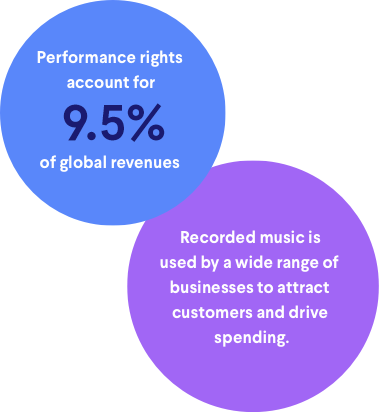Performance
Rights
Performance rights accounted for 9.5% of global recorded music revenues in 2023. The performance rights sector illustrates how music plays a vital part in driving a much broader range of economic activity.
IFPI works with music licensing companies across the world to help ensure that those who produce and perform music used for public performance and broadcast are fairly rewarded for their work.
In most countries, broadcasters are required to pay a royalty to the artists, producers and songwriters that created the music they play. In countries where full broadcast and public performance rights are not granted – such as the USA and Japan – IFPI and its partners continue to campaign.
In addition to broadcasters, recorded music is also used by a wide range of businesses — from bars to retailers, gyms to nightclubs — to attract customers, drive spending and motivate employees. These businesses are also required in most countries to pay a fee for the music they use.
Music licensing companies, authorised by record labels, collect revenue from these companies and distribute it to the relevant artists and producers.
Revenue from the use of sound recordings in broadcast and public performance saw an increase of 9.5% in 2023, building on the growth of the prior year.

Despite growth in the past couple of years, there is still plenty of untapped potential in the performance rights market
A global glance at performance rights
Despite strong growth in recent years, there is still plenty of untapped potential in the performance rights market.
Two of the largest economies in the world — the USA and Japan — still lack full broadcasting and/or public performance rights. Furthermore, rates paid by businesses playing music are still too low in many countries, not compensating artists and producers fairly for their music. Performance rights will continue to provide a vital and growing revenue stream for artists and producers.
MLC Code of Conduct and Standard Distribution Principles
IFPI and the global Music Licensing Companies (MLCs) have developed a Code of Conduct and set of Standard Distribution Principles that codify good practices and set common standards for the establishment and governance of MLCs, as well as the collection and distribution of revenues from the broadcast and public performance of recordings.
You can download them here:




 GMR
GMR ISRC
ISRC